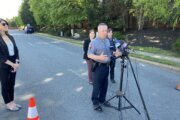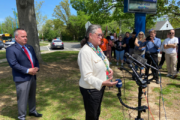The death of Pope Francis on Monday brought to an end a chapter of the papacy that emphasized focusing on marginalized people and prominent issues, such as LGBTQ+ rights and climate change.
Francis, 88, was the first Latin American and first Jesuit pope, and his tenure was marked by taking new, if measured, steps for the Catholic Church. Francis expanded the roles of women in the church, emphasized the church as a refuge for everyone, took a stance against far-right populism and consumerism, welcomed LGBTQ Catholics, and more.
CBS News’ Norah O’Donnell, who in 2024 was the first person from a U.S. network to have a one-on-one meeting with Pope Francis, spoke with WTOP’s Michelle Basch and John Domen to share more about Francis’ legacy, achievements and what happens next.
Read and listen to the interview below.
The following transcript has been lightly edited for clarity.
Norah O’Donnell: It is remarkable learning this morning that the people’s pope has died on Easter Monday. It was just about a year ago that we were there in Casa Santa Marta inside the Vatican interviewing Pope Francis, and we sat with him for about an hour. And I must tell you, I found him warm, funny, very smart, and also just a remarkable moment, because he was the first in so many ways: The first Jesuit Pope, first pope from the Americas, and the first pope to choose the name Francis because he loved St. Francis of Assisi. And of course, that characterized his entire papacy focusing on the marginalized, the poor, the peripheral, the forgotten. And I just have to say, I mean, one of the things I learned, when I was there a year ago and also about a month ago, Pope Francis set up showers in St. Peter’s Square for the homeless. He was always about directing attention to the people who are the most forgotten and need the most help. And I think that will be part of his legacy.
Michelle Basch: Can you talk about how different he was compared to previous popes?
Norah O’Donnell: Very different because, as I mentioned, just his own biography was so different. Look at how he dressed just the white cassock and the silver cross, not those regal red robes or gold or anything like that. He lived in Casa Santa Marta, which is the papal apartments, where, when you come and visit, you stay there, not in these luxurious papal apartments. He was different in the way he talked about issues, talking about migration a lot. That was where he tussled with the current Trump administration on that issue. He talked about climate change. He said climate change is the road to death at this point. I did talk to him about women in the Catholic Church, and while he said he would not allow women to become priests or deacons, he has appointed two women, two sisters, to prominent positions in the Vatican, taking care of finances and other stuff. One final thing is he has changed the funeral rights. So we will see this within the next week, a very different type of funeral for a pope. There will be a public viewing in St Peter’s Basilica, but he won’t be up on a platform. He wants to be down with the people, and then he will not be buried at the Vatican. That’s right. This is so different. Pope Francis wants to be buried at the Basilica of St. Mary Major, that is the largest and oldest Marian church in all of Rome, because he wants to bring attention to the Blessed Virgin Mary.
John Domen: The fact that his priorities and what he emphasized were so different from previous popes certainly rankled a lot of American Catholics. Now, going forward, when it comes to the Cardinals who will be picking his successor, many of them were elevated by Pope Francis. How do you sort of envision the future direction of the church sort of mapping out?
Norah O’Donnell: It’s a great question, and you’re right, he did rankle many conservatives from very his first year in office. When he was asked about gay priests, and he said, ‘Who am I to judge?’ There was a lot of outreach to the gay community and more as part of his papacy. But I think what you will see in this conclave, which, of course, will choose the next pope, is College of Cardinals will gather in Rome. There are about 130 more than that Cardinals around the world who will be part of this. More than 100 of them have been put into office by Pope Francis, so they reflect his ideology, his values, so that, I think also will be part of his legacy as the church continues to change slowly. I do think it’s worth noting that while Pope Francis was very inclusive and tried to be more inclusive and tried to open up the heart of the Catholic Church, in his words, as one Vatican observer told us, he changed the tune, but not the lyrics of the Catholic Church.
Get breaking news and daily headlines delivered to your email inbox by signing up here.
© 2025 WTOP. All Rights Reserved. This website is not intended for users located within the European Economic Area.



